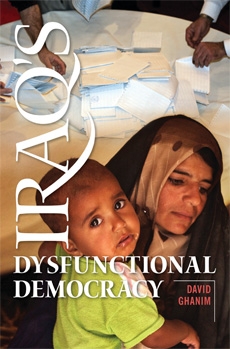|
PREFACE
No country has ever dominated international politics and media like Iraq. This international attention to the case of Iraq has generated a flood of publications covering the country. However, only a few publications have focused on the internal Iraqi experience per se. This book departs from mainstream literature on Iraq and focuses instead on domestic affairs in the country. An Iraqi perspective on what has happened since the regime change is highly needed. This book discusses the political development in Iraq since 2003, and the term “new Iraq,” which has been used in discourses describing the new experience. An approach that focuses on Iraq’s internal situation does not diminish international interest in the country. On the contrary, developments in Iraq have serious implications on various aspects of international politics and academic debate.
Whether or not most Americans approve, Iraq has become a U.S. legacy. For this reason, having a good and inspiring legacy in Iraq is in the best interests of the United States. Unfortunately, the American adventure in Iraq is primarily an exercise in hastily decided policies that lack careful thinking. Worse, the U.S. administration has adopted a rather simplified approach to understanding the Iraqi situation. While many people blame American political leaders for their failure to grasp the realities of Iraqi society, Iraqi history clearly demonstrates that this failure of apprehension extends to the Iraqis themselves. This is hardly surprising given Iraq’s long history of suppressing academic and intellectual freedom, the supremacy of partisan and identity politics, as well as the authoritarian order dominating social existence.
The United States has failed to find weapons of mass destruction or connections to terrorism in Iraq. Far more important, it has failed to establish democracy in that country. Merely replacing one authoritarian ruler with several ethnic and sectarian autocrats has severely disappointed the Iraqis, who have suffered enormously from authoritarian rule. The failure to establish democracy in Iraq also has serious implications for the Middle East, a region stubbornly resistant to democratic change. Although this failure works to the advantage of the many authoritarian rulers who dominate the region, it comes at the expense of the region’s current and future generations.
While the U.S. administration should perhaps have taken the objective of establishing democracy in Iraq more seriously and dealt with it patiently, Iraq, and the Middle East for that matter, missed a unique opportunity to improve the societies of that region. The Iraq War has involved huge human and financial costs on the part of the United States and other countries that the Iraqis need to acknowledge and appreciate. Regardless of what we think of the war, it has provided a unique opportunity for Iraqi society to break its decades-long cycle of violence and revenge. Iraq’s obvious failure to seize this historic moment may be the biggest mistake in the country’s history.
In this book, I adopt a critical approach to the new developments in Iraq, focusing on the Iraqis’ share of the responsibility for this miserable outcome. Contrary to conventional belief, a critical approach can be clothed in optimism; silence or indifference is clothed in pessimism. I remain optimistic that if we insist on applying constructive criticism, Iraq will one day become a new and better country. This book, therefore, is dedicated to the people of Iraq, acknowledging their suffering and encouraging them to create a prosperous future. While their suffering is their own making, their destiny is also in their own hands.
The greatest gratitude goes to my commissioning editor at Praeger Publishers, Valentina Tursini, for believing in this project and for her support and feedback on improving this work.
Introduction
Iraq has long been the main focus of international politics and media. It is unsurprising that there are many published works on the country. However, most of these works focus on the Iraq War in 2003 and the American occupation. Unfortunately, this comes at the expense of a more “internal” approach and analysis of the Iraqi experience per se. This project departs from the mainstream approach on Iraq and tries to fill a gap in the literature concerning this country. The purpose of this text is to study the situation in Iraq since 2003 and to investigate the credibility of the term “new Iraq,” which has been used in discourses describing the new experience in the country. This book highlights how the old and the new interact, and how change and continuity interplay in this experience. The major concern of this treatise is to find out if the new experience in the country truly represents a serious interruption from the violent past of Iraq or just a new name to an old and well-established game. It intends to scrutinize the many contradictions of the new experience, if not the very myth of new Iraq.
This text focuses on the dysfunctionality of democracy in Iraq as well as the centrality of violence, rationalized and justified by claims of victimhood, to Iraqi society and politics, and explores the various modalities of a broader context of violence: victimization, revenge, de-Ba’thification, lustration, incomplete and sectarian application of justice, separatist federalism, divisive and destabilizing constitution, illusionary democracy, deceptive legitimacy, and pernicious corruption. This text adopts a critical approach to the so-called new Iraq. Yet critical approaches are always clothed in optimism, ... | 